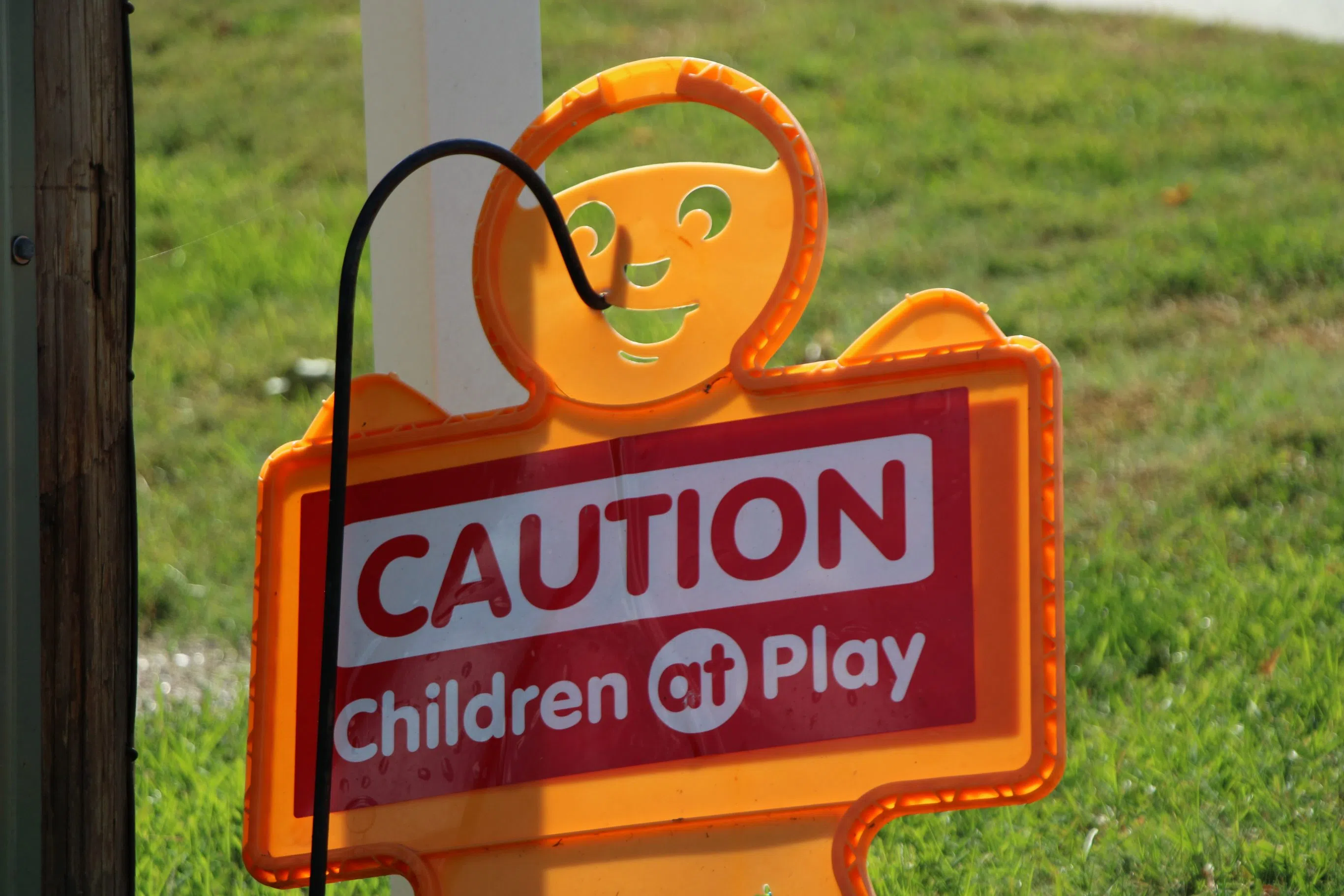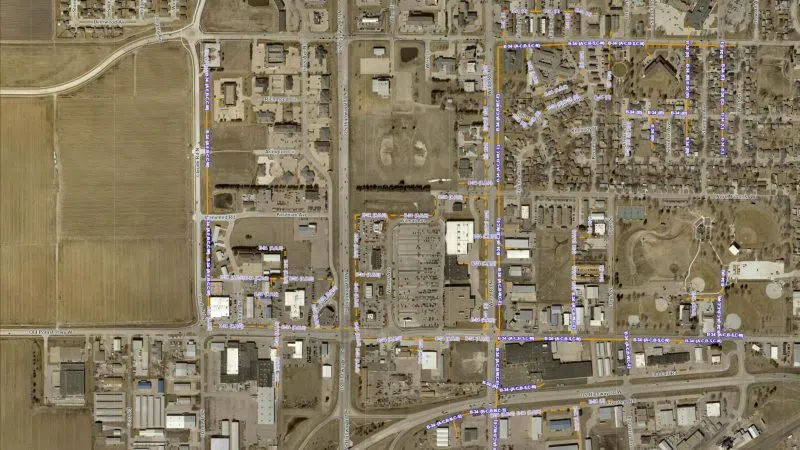
Children at Play sign, (Brian Neben, Central Nebraska Today)
KEARNEY — Access to high-quality childcare has been a pressing question for parents across the state for some time. Locally, the issue has been one of many that the Buffalo County Community Partners has made a focus.
Buffalo County Community Partners, (BCCP) a non-profit organization based in Kearney. Formed in 1996 by a group of 25 community stakeholders interested in building a healthier Buffalo County.
“Community Partners identifies issues impacting community’s well-being and addresses those issues by collecting and evaluating data and facilitating conversations among interested parties and community members,” the BCCP website stated.
“We build connections and gather collective experience, so innovative solutions can be implemented. We are uniquely positioned to do this work because we can devote the time needed, have access to the essential resources and have the experience to achieve a solution,” BCCP stated.
One of those essential resources needed in Buffalo County is access to high-quality childcare.
Tana Miller, BCCP Behavioral Health Coordinator, said that the area has a great childcare system in place that goes above and beyond for children and families, but the numbers seeking the care are higher than the current capacity.
Miller said that at the moment, one in four children in the area don’t have access to high quality childcare.
“Quality childcare offers children supportive, nurturing relationships with trusted teachers, and positive, diverse learning experiences. For children aged from birth to five years, quality childcare settings can make sure your child is ready for school. In these early years, children’s brains develop quickly,” according to Find Child Care.gov.
It was noted that Buffalo County is a partner with Communities for Kids, an initiative to assist our community to address childcare shortages by creating opportunities to build, enhance quality childcare and increase accessibility for parents.
Denise Zwiener, BCCP Executive Director, said that following community conversations in 2017, the organization began to investigate access to high quality childcare in the county.

Buffalo County Community Partners, Courtesy
Miller said a collaborative was formed with social-emotional development skills of children being their focus.
She noted that is a component of what BCCP does, to create spaces for conversations in the community to discuss gaps or what is being done well.
When the COVID-19 pandemic struck the area in 2020, it proved to be a transformative time, as childcare providers could directly take part in the conversation through Zoom meetings and share their needs and concerns, Miller said.
Zwiener said they also discovered different barriers that faced providers, such as the fact that many of them only had their smartphones to use for Zoom meetings. BCCP worked to procure laptops for providers so they could attend meetings from a platform other than their phones, which they needed throughout the day for their business.
In 2022, BCCP launched their Childcare Champions program, which paired veteran childcare providers with those who were interesting in entering the field and provided them with education and awareness in the licensing process through the Nebraska Department of Health and Human Services.
The Champions program also encouraged providers to embrace programs such as Rooted in Relationships, Step Up to Quality and Sixpence.
Rooted in Relationships is an initiative that partners with communities to implement evidence-based practices that enhance the social-emotional development of children, birth through age eight, according to Rooted in Relationships in Buffalo County.
Step Up to Quality recognizes the lifelong positive impact quality early childhood programs can have on young children and their families and partners with providers to recognize and improve quality, according to the Nebraska Preschool Development Grant.
“Sixpence provides funds and technical guidance to high-quality early childhood programs that address the unique needs of children from the prenatal period to age 3, focusing particularly on services for pre-born children, infants and toddlers who are most likely to encounter challenges to their healthy physical, cognitive and social development, putting them at risk of struggling in school and life,” according to the Sixpence Early Learning Fund.
In addition to helping new providers, the BCCP Champions program has also provided a way for childcare providers to network and provided those new in the field a place to find mentors and advice.
Zwiener said since the program was launched in 2022, they have helped to add 186 additional childcare spots in the county. Miller noted that many of the new spots created have been through new in-home daycares.
At a recent meeting of the Buffalo County Commissioners, BCCP was awarded $40,000 in American Rescue Plan funds that be used to continuing address the lack of childcare options in the area.
When asked about long-time in-home providers who may be retiring, Miller said that this is something BCCP has seen in more rural communities, there are several providers who have been in the business for years who may exit around the same period.
Zwiener said that is something Miller has been focusing on, engaging with the rural communities of Buffalo County and having conversations regarding early childhood, which includes childcare, preschool, etc.
Miller and Zwiener noted that Elm Creek, Ravenna and Pleasanton will be joining Communities for Kids, just as many other rural communities in central Nebraska have, including Bertrand, Overton, Eustis, etc.
Zwiener said the three Buffalo County communities are in the early stages of conversation, assessing the buy in from residents and finding out what will best fit their community.
The work of BCCP in early childcare mirrors their other efforts in keeping children out of the juvenile justice system, child and family healthcare and mental health needs, housing, food security, Zwiener noted, saying that all of these have wider community benefits.
The wider community benefits of having access to high-quality childcare are numerous.
Mike Feeken, Strategic Partnership Advisor with First Five Nebraska, spoke in Overton regarding the impacts the lack of childcare has in the nation.
First Five Nebraska was created in 2011 as the first organization in the state focused on advancing early childhood care and learning opportunities through policy change, strategic partnerships and public education, according to their website.
Feeken said he looks at childcare from an economic development perspective and noted that, “Today’s workers need childcare, tomorrow’s workers are in childcare.”
When speaking about childcare, Feeken said he often gets comments from people that they don’t need to be concerned about it, because they don’t have children who are of an age where they require childcare.
To that, Feeken always responds, “Everyone depends on someone who depends on childcare.”
He said while one might not be concerned about childcare, a business they frequent, an employee, their child’s teacher, etc. might depend heavily on childcare options.
He also asked the question if working parents struggle to find quality childcare, what happens if they drop out of the workforce.
Feeken said there are over 35,000 unfilled jobs in Nebraska, and it poses a serious obstacle to local and statewide economic growth.
The United States loses $122 billion in lost earnings, productivity, and revenue due to hampered access to childcare options for working parents.
Feeken said that childcare is deemed affordable if it accounts for seven percent or less of a family’s total income. Per First Five Nebraska calculations, Nebraskan’s are spending around 13 percent of their total income, which is “not affordable,” he said.
Based on the Center Based Infant Care, Overton and Elm Creek residents spend 16 percent on childcare, Kearney, 14 percent and Lexington, 18 percent.
Feeken also said that “price does not equal cost,” when it comes to childcare. He noted they cannot follow the usual pricing model, as they have to start with what parents can afford.
Childcare workers on the whole make half of what other workers in Nebraska make, Feeken said.
Per research from First Five, University of Nebraska – Lincoln and Bureau of Business Research, the total direct loss due to inadequate childcare is $489,383,432. The loss businesses face is $234,372,147 and the total loss to the state is $744,856,386.
Feeken said this study was conducted in 2019, so the COVID-19 pandemic and its resulting fallout have likely increased these numbers.
As for BCCP, they are planning on hosting a future community conversation regarding childcare at a date that will be announced soon.














